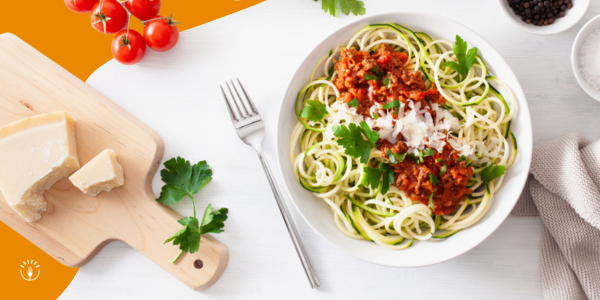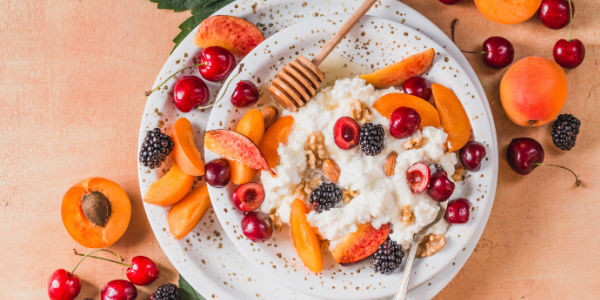
In the health world and industry, it is easy to fixate on fitness food products and supplements in hopes to bulk up and slim down. Unfortunately, such commodities often come with a hefty price tag without living up to its expense.
So men, if wondering what the best foods for your body are, look no further. Not only are these healthy foods for men sure to cultivate a leaner physique, but will enhance physical performance, strength, mood, and overall vitality!
The 13 Best Fitness Foods for Men
1. Oats
Especially when retaining the bran, or the, oats are packed with fiber, iron, magnesium, phosphorous, zinc, copper, manganese, selenium, potassium, and thiamin.
Especially when retaining the bran, increasing oat and whole grain intake has been associated to long-term weight loss in men. Incorporating more whole grains in the diet has also shown to increase concentration and mood and lower the risks of heart disease, cancer, and premature death.
A ½ cup of dry oats is considered a serving and makes an excellent pre-workout option to fuel the next gym session!
2. Whole Grain Pasta with Tomato Sauce
Unlike white pastas that undergo the refinement process and lose most of their nutrients, whole grain varieties supply the reputable nutrients described with oats.
Pair the pasta with tomato sauce to score up some vitamins A and C, potassium, folate, and lycopene, the naturally-occurring providing its red color. Lycopene bares some pretty impressive benefits, including reducing blood pressure, supporting the immune system, protecting skin and bone health, improving sperm parameters and pregnancy rates, lowering the risk of prostate cancer.
3. Cottage Cheese
Being a dairy product, cottage cheese supplies both casein and whey protein:
• Casein comprises 80 percent of the protein content of milk, supplies all the essential amino acids, and is considered "slow-acting." The slow and steady flow of amino acids is advocated to dramatically slow down the rate of protein breakdown, which is essential in sustaining lean body mass.
• Comprising the remaining 20 percent of milk protein, whey is considered to be "fast-acting" that fosters protein synthesis within an hour of intake.
The pairing of the two proteins helps keep stimulate muscle growth for hours, while the natural carb content of cottage cheese helps replenish glycogen stores. Cottage cheese also supplies modest amounts of sodium to replenish lost electrolytes through sweat.
Cottage cheese can stand on its own as a muscle-building food or pairs well with fresh fruit such as pineapple and peach slices.
4. Bananas
Bananas are a portable and reliable fruit to throw in your gym bag, as they help fuel workouts thanks to their energizing carbs they supply.
Potassium sourced from bananas has proven to protect against muscle cramps and weakness, ensure proper recovery, and replenish electrolytes lost in sweat. Potassium is additionally proven to reduce high blood pressure, kidney stones, and premature death.
Bananas are also a rich source of magnesium, manganese, riboflavin, vitamin A, and folate.
5. Blueberries
One cup of blueberries offers almost four grams of fiber for a mere 85 calories and provides large doses of vitamin K, manganese, and vitamin C.
Blueberries and other varieties are packed with antioxidants, plant compounds that defend the body against damage. Antioxidants have proven to protect and recover muscles following exercise, along with lowering the risks of certain diseases to promote a longer, healthier life.
Enjoy the natural sweetness of berries on their own, pair with a protein-packed Greek yogurt, or prepared into this simple, healthy blueberry cheesecake recipe to rid that pesky sweet tooth without an ounce of guilt!
6. Pomegranate Juice
Whereas whole pieces of fruit are generally recommended over their juiced from, pomegranate juice shows some pretty impressive benefits when it comes to prospering fitness and overall health.
In its juice form, the antioxidant potential of pomegranate juice is more than that of red wine and green tea! Research denotes drinking pomegranate juice pomegranates may actually advance exercise performance and promote greater muscle recovery.
The juice has also been linked to improvements in blood pressure, cholesterol, and blood sugar levels.
7. Eggs
Eggs crack open some serious health benefits for men, as they are loaded with high-quality protein to maximize muscle growth.
And don't skimp out on the yolk! Researchers at the University of Illinois found eating three whole eggs, providing 18 grams of protein, after resistance exercise boosted muscle building and repair 40 percent greater than eating solely just the egg whites with an equal amount of protein.
The yolk is also one of the few natural sources of vitamin D, playing a role in bone health and showing to improve testosterone levels. The entire egg is rich in choline, omega-3 fatty acids, fat-soluble vitamins, phosphorus, and iron.
8. Chicken
Chicken isn't acknowledged as a "bro food" without reason… Chicken is a lean protein source offering 21 grams of protein per three ounces.
In addition to its adequate protein content, chicken is a good source of selenium, phosphorus, and B vitamins, all of which support cell repair and a healthy metabolism.
To naturally withhold its high-protein content without worrying about fat, opt for a skinless chicken breast and pair with a whole grain and veggie for a muscle-building, balanced meal.
9. Grassfed Beef
While the beef on red meat continues, there is some new evidence suggesting 18-ounces of lean, unprocessed meat can fit into a well-balance diet. Beef supplies 23 grams of protein per three ounces and is filled with muscle-supporting nutrients such as iron and zinc.
Going for grassfed beef lends lesser saturated fat and more polyunsaturated fats (PUFAs) and omega-3 fatty to combat inflammation and promote efficient muscle recovery.
10. Tuna
Not only is canned tuna budget-friendly and cost-effective, but highly nutritious and offers 14 grams of lean protein per two ounce serving! The fat it does provide, however, is from those notorious omega-3 fatty acids, which helps reduce inflammation post-exercise, support muscle growth, and protect heart health.
When selecting tuna, select a product soaking in water rather than oil and salt. Enjoy it straight from the can or pouch for a simple snack, throw into a salad, or prepare this super healthy tuna burger.
11. Turkey
Turkey is one of the leanest sources of protein, along with supplying zinc, niacin, choline, selenium, and vitamins B6 and B12.
Beyond the provision of muscle-building nutrients, the tryptophan in turkey and other poultry options can also have improve mood, concentration, and overall positive feelings of wellbeing.
12. Beans
While animal meats can fit into a well-balanced diet, men are likewise encouraged to incorporate plant-based proteins such as beans.
Beans pack an average of 15 grams of fiber per half cup and supply a healthy dose of magnesium, iron, phosphorus, and potassium.
Nonetheless, beans are a nutrient-dense, plant-based, muscle-building food to include in a muscle-building diet for men. Beans can be thrown into soups, chilis, salads, and casseroles thanks to their versatility.
13. Water
Okay, while water is not technically a healthy food for men, health would truly be nothing without it! Maintaining and achieving hydration is key for fitness and overall health, as water transports nutrients to muscle cells and increases new muscle tissue.
And not to mention, dehydration impairs physical performance and causes muscles to cramp. To ensure sufficient hydration, the recommended adequate intake for men is 3.7 liters (or about 15 cups) of fluid per day, especially in the form of water over sugary drinks.
Regular exercisers and athletes should additionally drink 16 ounces of water leading up to activity, six to 12 ounces immediately prior to exercise, and every 15 to 20 minutes of active training.







